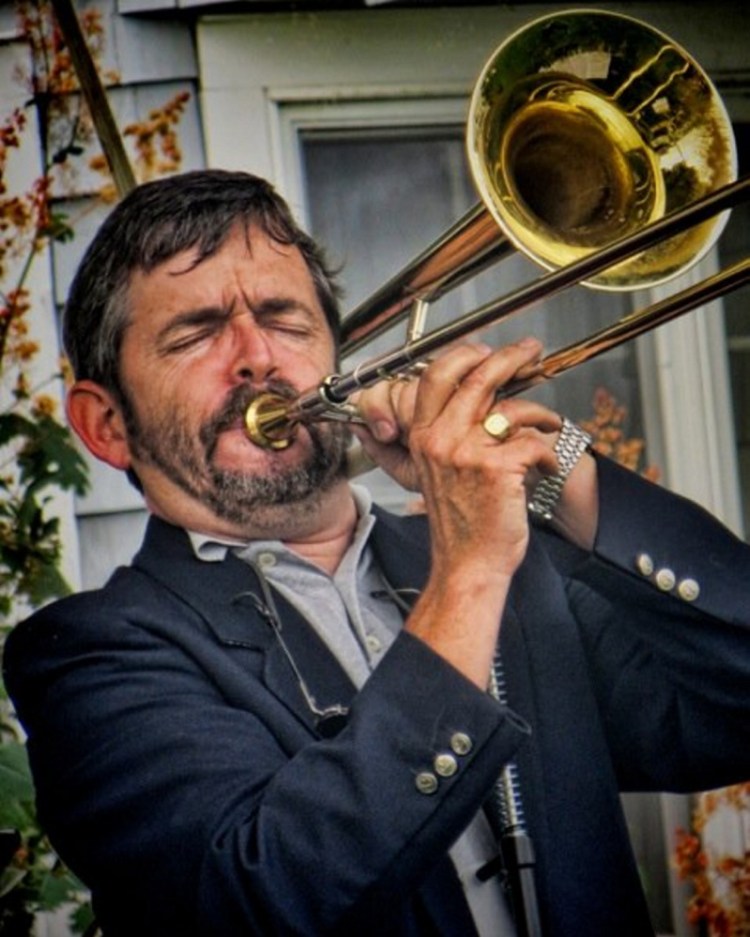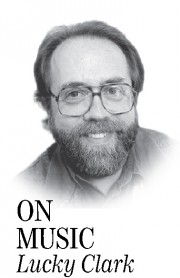If jazz is your thing, may I make a suggestion? Head down to the Jewett Hall Auditorium on Sunday, Oct. 29, for a concert featuring Novel Jazz. The septet is made up by Barney Balch (tenor, alto and soprano trombone); Mike Mitchell (trumpet, cornet and flugelhorn); Bill Manning (drums); Herb Maine (bass); David Clarke (guitar); Mickey Felder (piano); and Sean Potter (alto sax). This band has dedicated themselves, as stated on their webpage, to “keeping the music of Duke Ellington and Billy Strayhorn alive and swinging.” Seeing this was a new group for me, I wanted to find out more and at the end of a marathon email session, Barney Balch called me via Skype from Israel where he was traveling.
Q: I understand that you are overseas to give a keynote speech at an international oceanic climate change symposium, correct?
Balch: Well, it’s not exactly a climate change symposium, but yes, it is a meeting between the host institution in Eilat, Israel, and the Dalhousie University, which is in Halifax. And since I do a lot of oceanographic work between Portland, Maine, and Yarmouth, Nova Scotia, they figured I’d be a good one to talk about it, and I will indeed be talking about climate change, but the meeting itself is about a broader marine topic than that.
Q: When I discovered you were out of the country it made me wonder if you have the opportunity to check out the local music scene in there?
Balch: Well, we got to hear some music yesterday but I’ve got some time before the meeting so my wife and I are traveling around the country and we did get the chance to hear some music and it was pretty cool. It was more folk music than jazz but definitely music makes the experience.
Q: I know I should be talking about your concert at Jewett Hall Auditorium, but I really find this side of your life very fascinating, to say the least.
Balch: Well, as I like to say, the music balances my left brain and my right brain. My day gig as a scientist is much more right brain and the music part of me helps balance out the left brain.
Q: I love it! So let’s pursue that left brain for a while and talk about your upcoming gig in Augusta. Now is your group’s name pronounced “no-VEL” or “NOV-el”?
Balch: Well, we get both actually because Rich Tozier on Maine Public Radio for years has called us “no-VEL” Jazz Septet and I’ve always referred to us as “NOV-el” Jazz Septet, and the reason being that early on in the band’s history we started doing a regular thing at the Skidompha Public Library in Damariscotta, (it’s) nice to keep the chops going during the long winter period, (and) they were very kind to allow us to perform in their atrium because there were wonderful acoustics there. So back when my daughter was all of six years old I asked her, “What shall we call this band?” and she said, “Well, something having to do with a library — how about ‘novel?'” and that’s the honest-to-God truth.
Q: That’s neat! Now it says on your bio sheet that your group’s specialty is the music and history of Duke Ellington and Billy Strayhorn.
Balch: Yeah, and that goes back to that library where one of the band members called out a Duke Ellington song that I had never heard of and I asked the silly question which turned out to start this whole adventure: “Gee, I wonder how many songs Billy Strayhorn and Duke Ellington wrote?” And the answer to that question turns out to be about three thousand compositions. I had no idea that they were that prolific.
Q: Neither did I. That’s amazing.
Balch: Well, I did some research and found out that the Duke Ellington collection is at the Smithsonian Institution in Washington, D.C. at their Museum of American History. They have 450 book boxes of music that comprise this collection which was granted from Duke’s son Mercer Ellington after Duke’s death. I asked and received permission, with certain conditions and some training on how to handle historical documents, and went down there to study those compositions. I was able to hold the original versions of “Mood Indigo” and “Take the A Train.” So that combined my love of research and my love of music. That’s how it all started.
Q: What an incredible undertaking that must have been.
Balch: Well, I listened to old recordings and discussed it with the band so when I went down there I was armed knowing exactly which book box and which folder within the book box I needed to find the particular tunes I wanted to study. That way I could be more efficient in working there. The actual arrangements and stuff doesn’t happen until once I’m out of there. And it’s a bit of work that goes into making arrangements of those compositions because we’re arranging from an 18-piece orchestra to a seven-piece band. That has its own challenges. Usually the way our season goes is we perform during the summer months into the fall and then the schedule slacks up and we start working on arrangements. I’m not the only one that does arranging, other members do, too. Then somewhere in January or February we get together to do a first cut of the tunes and then we think about how we’re going to perform them. We do not necessarily perform the tunes exactly as they were performed on the recordings from 1938, for example, but we think about ways we could present it that might bring it up to date harmonically into the 21st century. So we’ll dust them off, dress them up and give them a new sound, which I think either of those two gentlemen would really appreciate. It’s pretty exciting in that respect.
Q: Now have you done this Concert at Jewett series before?
Balch: No, I’ve been wanting to do the Jewett concerts for a couple of years now so we’re really excited about it.
Q: Is there anything you’d like to pass on to the folks reading this article about your venue debut there in Augusta?
Balch: Well, I think the main point about this is that while we focus on Ellington and Strayhorn, we also do tunes in the show by members of the Ellington orchestra, as well. Also, I’d like to mention that every tune has a story about it, and our shows mix in the history of the music to introduce each tune — that is an important part of the show.
Lucky Clark has spent 45 years writing about good music and the people who make it. He can be reached at luckyc@myfairpoint.net if you have any questions, comments or suggestions.
Send questions/comments to the editors.




Success. Please wait for the page to reload. If the page does not reload within 5 seconds, please refresh the page.
Enter your email and password to access comments.
Hi, to comment on stories you must . This profile is in addition to your subscription and website login.
Already have a commenting profile? .
Invalid username/password.
Please check your email to confirm and complete your registration.
Only subscribers are eligible to post comments. Please subscribe or login first for digital access. Here’s why.
Use the form below to reset your password. When you've submitted your account email, we will send an email with a reset code.